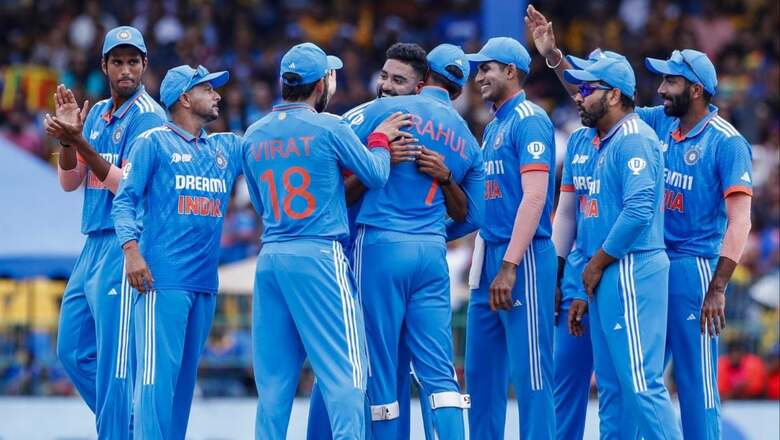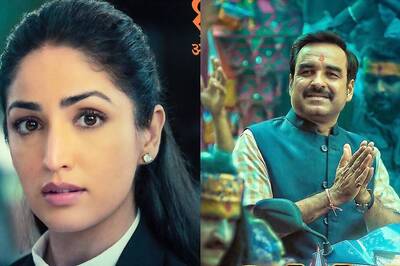
views
Cricketing action in the 2023 ICC Men’s Cricket World Cup solely hosted by India for the first time has already started. The Men in Blue will play their first match against Australia tomorrow. Millions of fans of Indian cricket are hoping that their favourite team will win the first encounter — and ultimately win the tournament. As the best in the world will admit for sure, getting that crown is seriously difficult.
Today, few talk about India’s less-than-ordinary performance in the inaugural edition of the World Cup in 1975. The Srinivas Venkatraghavan-led squad beat East Africa, its only win. However, a strong England side thrashed India by 202 runs. One knock in the Indian innings against England was universally criticised: opener Sunil Gavaskar’s unbeaten 36 off 174 balls in an innings that saw India finish at 132/3 in response to the target of 335 runs. In the last Group stage match, New Zealand beat India by four wickets. In the second edition in 1979, India lost all three Group stage matches – including one against then-minnows Sri Lanka by 47 runs. When this edition ended, who would have thought that India would win the next World Cup four years later?
Led by all-rounder Kapil Dev, India pulled off the unexpected in 1983. After two wins and two losses in the first four matches in the Group stage, India seemed down and out against Zimbabwe. Batting first, the team lost the first five wickets for a mere 17 runs before Dev scripted history with a brilliant unbeaten 175 from 148 balls that helped India reach 266/8. Zimbabwe responded with 235, resulting in a famous Indian victory by 31 runs. After demolishing Australia in the last group stage match and going past England in the semis, India met West Indies, one of the best teams of all time. A West Indies triumph seemed inevitable, but Dev and his men did not give up.
Batting first at Lord’s, England, India scored a modest 183 as the famed West Indies pace quartet consisting of Andy Roberts, Joel Garner, Malcolm Marshall and Michael Holding kept the batsmen in check. No Indian batsman scored too many, but Krishnamachari Srikanth (38), Mohinder Amarnath (26) and Sandeep Patil (27) made contributions that proved to be crucial. West Indies responded with 140, resulting in an Indian win by 43 runs. India had achieved the seemingly impossible, but not before Gordon Greenidge misread a Balwinder Sandhu in-dipper and got clean bowled, Viv Richards mistimed a pull and Kapil Dev sprinted backwards to take a famous running catch, and finally, when Mohinder Amarnath trapped the last man Michael Holding leg before. Celebrations of Indian fans resonated across the world after Holding fell. India had won.
The 1983 triumph was a landmark in the history of Indian cricket. The cricket-loving nation had testified to its ability to surprise and beat the best in the shorter format. However, India did not reach the finals before the 2003 edition. In 1987, the team, led by Dev, lost to England in the semis. The tournament saw Chetan Sharma’s hat-trick against New Zealand, Gavaskar’s only ODI century in the same match, and an India-Australia thriller in the Group stage the Aussies won by one run. In the 1987 edition co-hosted by India and Pakistan, the former was billed as the pre-tournament favourites. The end result was a disappointment as the team finished as the losing semifinalist on the first out of the four occasions so far.
In 1992, the Mohammed Azharuddin-led squad finished seventh in the round-robin stage, ahead of Sri Lanka and Zimbabwe. In 1996, the team under Azharuddin’s captaincy reached the semis that was played against Sri Lanka. Match referee Clive Lloyd awarded the match to Sri Lanka, who would have won with ease in any case, because of the dangerously unruly crowd behaviour at Eden Gardens, Kolkata. 1999 saw the team’s exit in the newly introduced Super Six stage after a loss against Australia, a win against Pakistan, and a loss against New Zealand in a match reduced to a dead rubber because the Kiwis had already qualified for the semis.
In 2003, the well-balanced Sourav Ganguly-led Indian team reached the finals for the first time since 1983. But it lost the finals to a strong Australian team by 125 runs. Australia’s emphatic win notwithstanding, the Indian team made several statements of first-rate performances during the course of its journey to the finals. Tendulkar led the way by scoring 673 runs, a Man of the Tournament-winning performance.
After a forgettable 2007 campaign leading to an early exit under Rahul Dravid’s captaincy, India, under Mahendra Singh Dhoni’s leadership, won the World Cup for the second time in 2011. Playing in familiar conditions as one of the co-hosts, along with Sri Lanka and Bangladesh, was crucial as India beat Sri Lanka in the finals to become the champions of the world. The moment of the match: Dhoni’s hit that sent a Nuwan Kulasekara delivery beyond the boundary for a six to get the winning runs in the all-important match. The victory was a precious moment for Tendulkar, who finally played in a World Cup-winning squad in his illustrious career and finished as the second-highest run-getter of the tournament with 482 runs. Khan bowled brilliantly to pick up 21 wickets, but Yuvraj Singh became the Player of the Tournament because of his contributions of 362 runs and 16 wickets to the winning cause.
In 2015, under Dhoni again, India won each match until it met with Australia in the semifinals. A 95-run loss against Australia led to India’s exit, but not before opener Shikhar Dhawan accumulated 412 runs in the tournament, including two centuries. Umesh Yadav and Mohammad Shami picked up 18 and 17 wickets, respectively. In 2019, India cruised with few hiccups under star batsman Kohli’s captaincy before a second successive semifinal loss, but this time against New Zealand. The tournament had several fine Indian performances, led by Rohit Sharma’s 648 runs, which included five centuries. Jasprit Bumrah picked up 18 wickets with an exemplary economy rate of 4.41, while Shami, in the match against Afghanistan, became the second Indian bowler to achieve a World Cup hat-trick.
Why have Team India emerged as the pre-tournament favourites to win the present edition? The reason is two-fold: familiar conditions and the team’s form. In Kohli, captain Rohit Sharma, Shubman Gill, Shreyas Iyer and KL Rahul, they have batsmen who can score quickly and also bat for long periods. Hardik Pandya has been delivering both as a middle-order bat and a bowler with the ability to pick up wickets. Ishan Kishan is in good form, while Suryakumar Yadav can torment the opposition with his inventive shot-making on a good day.
Ravindra Jadeja is a solid all-rounder with a good record of significant performances, while the list of bowlers consisting of fine performers like Bumrah, Kuldeep Yadav, Mohammed Shami, Mohammed Siraj and Ravichandran Ashwin makes strong statements of the team’s overall quality as a unit. Shardul Thakur can be expensive, but he has a knack of picking up wickets.
Facing Team India will be a serious challenge for any opposition. But, will the Men in Blue win the World Cup for the third time? As the team begins its journey once again, we must keep our fingers crossed.
The author, a journalist for three decades, writes on literature and pop culture. Among his books are ‘MSD: The Man, The Leader’, the bestselling biography of former Indian captain MS Dhoni, and the ‘Hall of Fame’ series of film star biographies. Views expressed in the above piece are personal and solely that of the author. They do not necessarily reflect News18’s views.




















Comments
0 comment